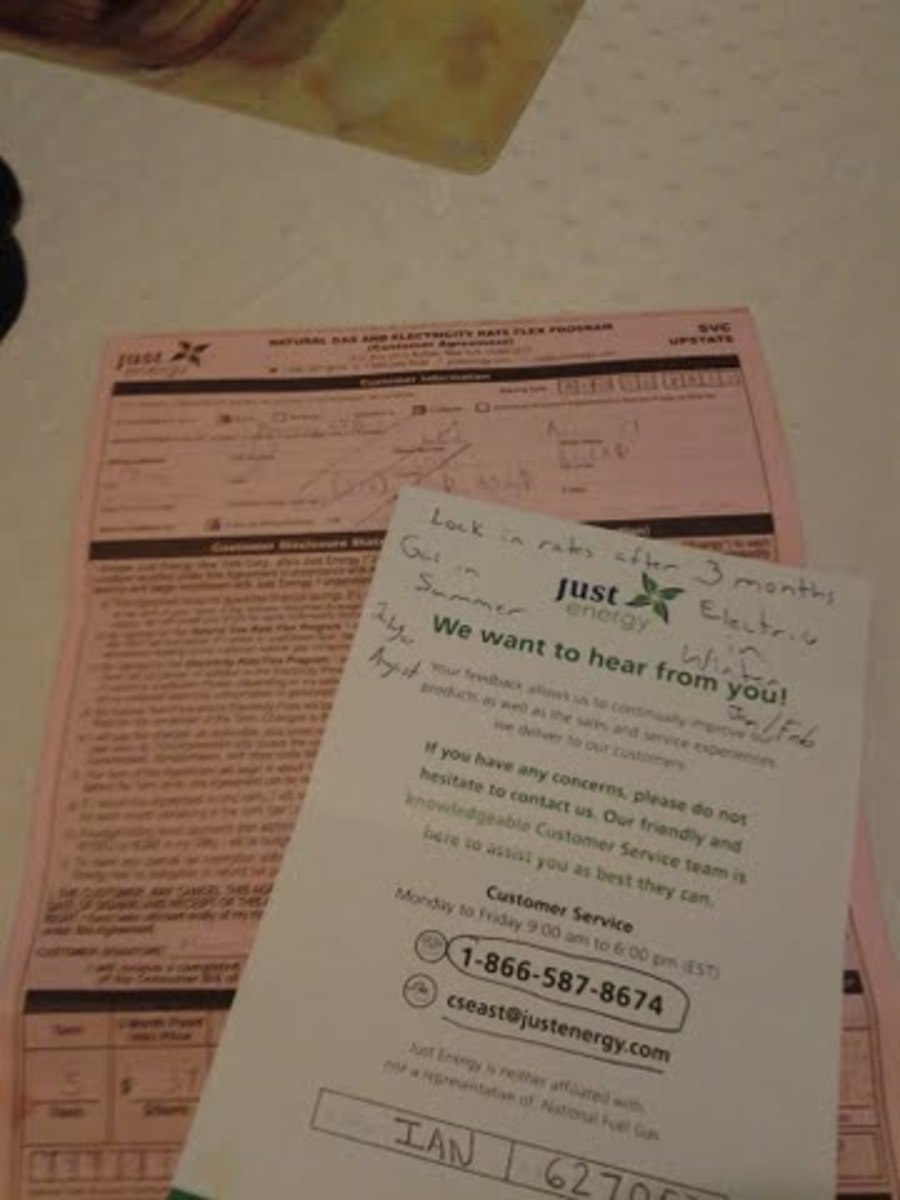Door to Door Scams: What to Do When a Stranger Comes Knocking

A man comes to your door. He's wearing a shirt from a well-known company but something doesn't feel right. Maybe he's offering you something that's too good to be true, maybe he's asking to enter your home under a strange pretense, and maybe he just sets off your inner alarm. Whatever the reason, if someone doesn't feel right you need to heed your instincts. It's true, the visitor could be legitimate, but it's also true that he could be attempting a door to door scam, a property crime, or a crime of violence. It's unfortunate but, these days, you can never be too careful.

Door to Door Scams
Summer and early fall are peak times for door-to-door solicitations and also prime time for door-to-door scams. Not all salespeople are bad but there are a few things to look for in order to keep yourself safe.
- If a deal seems to good to be true, it probably is. This is common sense but, in this rough economy, it is often tempting to jump at a supposed low-ball deal. Resist the urge and save yourself from future troubles.
- Beware if a sales person is overly aggressive and imploring you to start immediately. My favorite version of this is the old "today is the last day I can offer this deal" ploy. If they are pressuring you to not take any time to think about a purchase, that's a red flag.
- If there is no written bid or contract, walk away. They may tell you that they are a small business and don't have the staff to handle the paperwork. They may even offer that they are trustworthy, Christian folk. Look, I'm going to be honest on this. I'm a Christian but I don't use that fact to negotiate business deals. If a person is weilding their faith like it's some sort of weapon, there's something wrong, there. Most people who bring it up all of the time are trying to hide something.
- If your inner alarm goes off--heed it. Your sixth sense is there for a reason. Maybe it's your sub-conscious picking up on mannerisms, maybe it's something else, but I know, for sure, I have never been wrong when my inner alarm goes off.
- If they are not listed in the phone book, have no physical address and you are unable to reach an actual human being when you call a local number, do some further research. If the business is legitimate, they will have no problem providing references or allowing you to check them out before coming to an agreement.

Common Door to Door Scams in the News
Seniors are always a major target of scammers but everybody is a potential mark. According to the AARP (American Association for Retired People) and the Better Business Bureau, there are a few favorite scams that these people will employ.
- Power company imposters. These people claim to be from your electric or gas company and will offer to give you a free home energy audit. Does that sound useful? Don't fall for it. Your power company will not send people to your home unannounced. There are these lovely inventions called phones and power companies are well acquainted with them. They will ask to enter your home but auditing your energy use is not their goal. These people are looking to burglarize you. Often working in pairs, one will distract you while the other steals from you.
- Fundraising scams. If you live in a town with teenagers in it you can count on being approached to support schools, teams or clubs by donating directly or by purchasing magazines, wrapping paper or cookie dough. Many of these fundraisers are legitimate but they are easily checked on. Call the school or look on the internet. If it's legit, the kids can come back later to collect or you can mail in your donation. "Beware of charities you have never heard of, especially those claiming to raise money for wounded vets, police and fire departments, sick or handicapped kids, or the victims of a recent disaster," warns the AARP. "Those causes are emotional hot buttons for many but are often associated with fake charities."
- The handyman scam. These people come to your door claiming to be able to do whatever you need. Roofing, siding, tree trimming, anything you require they claim to be able to do it. They may claim to work for Home Depot or Lowes. If they do, great. You can check it out easily. Make sure you can trust a person before allowing them to work on your home.
- Driveway sealer scam. "Hi, there. We're in the neighborhood and have some left over materials and would love to seal your driveway for a low ball price. All we need is for you to pay us up front and we'll get to work right away." According to the BBB, at best you're out some money. In the worst case, they slather on something like motor oil all over your driveway and you're not only out money but you have a big mess to clean as well.

My Personal Experience with Suspicious Strangers at My Door
I have personally been a target for shady door to door activity. As a stay-at-home mother, I am home alone with the kids every day. When they were very young, a man wearing a cable company shirt came knocking at my door. He informed me that he had detected a cable leak and needed to come into my home to determine the problem. This man had a badge identifying him as a cable employee and looked correct but I did not see a truck. For some reason, my inner alarm went off. I told him I would not let him in my home and that I have never heard of something as absurd as a "cable leak".
We own boxers. My boxer, Sophie, was a good-natured, warm, and exhuberant dog who enjoyed meeting people and dogs. She also had an uncanny gift for detecting danger. Throughout this brief conversation, Sophie had naturally taken her defensive position, placing herself between me and the stranger at an angle and without making eye contact. When I noticed her position, I knew it wasn't just me being silly. "Leave me your card," I said. "I'll call the cable company and if they say this is a legitimate issue, I'll comply, but you are not getting in my house right now." The man insisted, more aggressively that he be let into my house and made a move to step inside. My beautiful, warm, friendly dog turned on him and in full boxer stance, growled deeply. He stepped back, wished me a good day and left. My heart was beating a mile a minute.
I immediately called my husband. I had gotten the man's name from the badge and relayed it to him. My husband called the cable company. The cable company verified that there is indeed such a thing as a cable leak but an employee can fix that outside of the home and shouldn't be requesting entrance to your house. We were informed that if an employee should ever need to come into our home, an appointment would be set. They also verified the employee but said he should not have been working in my area. We were left with the impression that this employee would be losing their job over the incident. The cable company was very serious about the professionalism of their employees and the safety of their customers.
I'm not certain what that man's intentions were and, quite frankly, I'm glad I wasn't put in a situation to find out. I am glad that I didn't blindly trust a man in a company shirt and heeded my inner warnings. When dealing with strangers that come knocking at your door, you can never be too careful.
Have you ever been approached by a door to door scammer?
United States and Canada Better Business Bureau
Final Tips to Avoid Being Scammed
The Better Business Bureau offers some great tips to avoid being scammed.
- Don't let the stranger into your house. Isn't that what our mothers told us so very long ago? "While there are legitimate salespeople that still make door-to-door visits, consumers should be very cautious by not allowing any unexpected guests into their home," warns the BBB.
- Pay attention and listen carefully to what they say. Get everything in writing and verify that what they are saying is true.
- Don't be pressured into anything. If someone is putting on the pressure, they are trying to rob you of the opportunity to think it through. Why would you give someone that advantage?
For more information on how to avoid being scammed or how to report a scam, contact your local Better Business Bureau. If you have been scammed, call the company, cancel your order and report it to the authorities immediately. You don't want the same thing to happen to somebody else.
Citations:
Kirchheimer, Sid. "Knock, Knock. Who's Really There." AARP. AARP, August 30, 2010. Web. 23 Jul 2012.
Better Business Bureau. BBB, 2012. Web. 23 Jul 2012. http://www.bbb.org/us/.
©Denise Mai, July 23, 2012. All rights reserved.
Follow me on Twitter! @denise_mai







